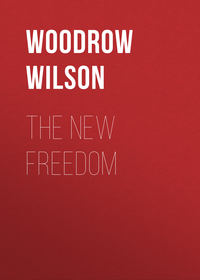 полная версия
полная версияWhen a Man Comes to Himself

Woodrow Wilson
When a Man Comes to Himself
I
It is a very wholesome and regenerating change which a man undergoes when he “comes to himself.” It is not only after periods of recklessness or infatuation, when he has played the spendthrift or the fool, that a man comes to himself. He comes to himself after experiences of which he alone may be aware: when he has left off being wholly preoccupied with his own powers and interests and with every petty plan that centers in himself; when he has cleared his eyes to see the world as it is, and his own true place and function in it.
It is a process of disillusionment. The scales have fallen away. He sees himself soberly, and knows under what conditions his powers must act, as well as what his powers are. He has got rid of earlier prepossessions about the world of men and affairs, both those which were too favorable and those which were too unfavorable—both those of the nursery and those of a young man’s reading. He has learned his own paces, or, at any rate, is in a fair way to learn them; has found his footing and the true nature of the “going” he must look for in the world; over what sorts of roads he must expect to make his running, and at what expenditure of effort; whither his goal lies, and what cheer he may expect by the way. It is a process of disillusionment, but it disheartens no soundly made man. It brings him into a light which guides instead of deceiving him; a light which does not make the way look cold to any man whose eyes are fit for use in the open, but which shines wholesomely, rather upon the obvious path, like the honest rays of the frank sun, and makes traveling both safe and cheerful.
II
There is no fixed time in a man’s life at which he comes to himself, and some men never come to themselves at all. It is a change reserved for the thoroughly sane and healthy, and for those who can detach themselves from tasks and drudgery long and often enough to get, at any rate once and again, a view of the proportions of life and of the stage and plot of its action. We speak often with amusement, sometimes with distaste and uneasiness, of men who “have no sense of humor,” who take themselves too seriously, who are intense, self-absorbed, over-confident in matters of opinion, or else go plumed with conceit, proud of we cannot tell what, enjoying, appreciating, thinking of nothing so much as themselves. These are men who have not suffered that wholesome change. They have not come to themselves. If they be serious men, and real forces in the world, we may conclude that they have been too much and too long absorbed; that their tasks and responsibilities long ago rose about them like a flood, and have kept them swimming with sturdy stroke the years through, their eyes level with the troubled surface—no horizon in sight, no passing fleets, no comrades but those who struggled in the flood like themselves. If they be frivolous, light-headed men without purpose or achievement, we may conjecture, if we do not know, that they were born so, or spoiled by fortune, or befuddled by self-indulgence. It is no great matter what we think of them.
It is enough to know that there are some laws which govern a man’s awakening to know himself and the right part to play. A man is the part he plays among his fellows. He is not isolated; he cannot be. His life is made up of the relations he bears to others—is made or marred by those relations, guided by them, judged by them, expressed in them. There is nothing else upon which he can spend his spirit—nothing else that we can see. It is by these he gets his spiritual growth; it is by these we see his character revealed, his purpose and his gifts. Some play with a certain natural passion, an unstudied directness, without grace, without modulation, with no study of the masters or consciousness of the pervading spirit of the plot; others give all their thought to their costume and think only of the audience; a few act as those who have mastered the secrets of a serious art, with deliberate subordination of themselves to the great end and motive of the play, spending themselves like good servants, indulging no wilfulness, obtruding no eccentricity, lending heart and tone and gesture to the perfect progress of the action. These have “found themselves,” and have all the ease of a perfect adjustment.
Adjustment is exactly what a man gains when he comes to himself. Some men gain it late, some early; some get it all at once, as if by one distinct act of deliberate accommodation; others get it by degrees and quite imperceptibly. No doubt to most men it comes by slow processes of experience—at each stage of life a little. A college man feels the first shock of it at graduation, when the boy’s life has been lived out and the man’s life suddenly begins. He has measured himself with boys; he knows their code and feels the spur of their ideals of achievement. But what the world expects of him he has yet to find out, and it works, when he has discovered, a veritable revolution in his ways both of thought and of action. He finds a new sort of fitness demanded of him, executive, thorough-going, careful of details, full of drudgery and obedience to orders. Everybody is ahead of him. Just now he was a senior, at the top of the world he knows and reigned in, a finished product and pattern of good form. Of a sudden he is a novice again, as green as in his first school year, studying a thing that seems to have no rules—at sea amid crosswinds, and a bit seasick withal. Presently, if he be made of stuff that will shake into shape and fitness, he settles to his tasks and is comfortable. He has come to himself: understands what capacity is, and what it is meant for; sees that his training was not for ornament or personal gratification, but to teach him how to use himself and develop faculties worth using. Henceforth there is a zest in action, and he loves to see his strokes tell.
The same thing happens to the lad come from the farm into the city, a big and novel field, where crowds rush and jostle, and a rustic boy must stand puzzled for a little how to use his placid and unjaded strength. It happens, too, though in a deeper and more subtle way, to the man who marries for love, if the love be true and fit for foul weather. Mr. Bagehot used to say that a bachelor was “an amateur at life,” and wit and wisdom are married in the jest. A man who lives only for himself has not begun to live—has yet to learn his use, and his real pleasure, too, in the world. It is not necessary he should marry to find himself out, but it is necessary he should love. Men have come to themselves serving their mothers with an unselfish devotion, or their sisters, or a cause for whose sake they forsook ease and left off thinking of themselves. It is unselfish action, growing slowly into the high habit of devotion, and at last, it may be, into a sort of consecration, that teaches a man the wide meaning of his life, and makes of him a steady professional in living, if the motive be not necessity, but love. Necessity may make a mere drudge of a man, and no mere drudge ever made a professional of himself; that demands a higher spirit and a finer incentive than his.
III
Surely a man has come to himself only when he has found the best that is in him, and has satisfied his heart with the highest achievement he is fit for. It is only then that he knows of what he is capable and what his heart demands. And, assuredly, no thoughtful man ever came to the end of his life, and had time and a little space of calm from which to look back upon it, who did not know and acknowledge that it was what he had done unselfishly and for others, and nothing else, that satisfied him in the retrospect, and made him feel that he had played the man. That alone seems to him the real measure of himself, the real standard of his manhood. And so men grow by having responsibility laid upon them, the burden of other people’s business. Their powers are put out at interest, and they get usury in kind. They are like men multiplied. Each counts manifold. Men who live with an eye only upon what is their own are dwarfed beside them—seem fractions while they are integers. The trustworthiness of men trusted seems often to grow with the trust.
It is for this reason that men are in love with power and greatness: it affords them so pleasurable an expansion of faculty, so large a run for their minds, an exercise of spirit so various and refreshing; they have the freedom of so wide a tract of the world of affairs. But if they use power only for their own ends, if there be no unselfish service in it, if its object be only their personal aggrandizement, their love to see other men tools in their hands, they go out of the world small, disquieted, beggared, no enlargement of soul vouchsafed them, no usury of satisfaction. They have added nothing to themselves. Mental and physical powers alike grow by use, as every one knows; but labor for oneself is like exercise in a gymnasium. No healthy man can remain satisfied with it, or regard it as anything but a preparation for tasks in the open, amid the affairs of the world—not sport, but business—where there is no orderly apparatus, and every man must devise the means by which he is to make the most of himself. To make the most of himself means the multiplication of his activities, and he must turn away from himself for that. He looks about him, studies the facts of business or of affairs, catches some intimation of their larger objects, is guided by the intimation, and presently finds himself part of the motive force of communities or of nations. It makes no difference how small a part, how insignificant, how unnoticed. When his powers begin to play outward, and he loves the task at hand, not because it gains him a livelihood, but because it makes him a life, he has come to himself.
Necessity is no mother to enthusiasm. Necessity carries a whip. Its method is compulsion, not love. It has no thought to make itself attractive; it is content to drive. Enthusiasm comes with the revelation of true and satisfying objects of devotion; and it is enthusiasm that sets the powers free. It is a sort of enlightenment. It shines straight upon ideals, and for those who see it the race and struggle are henceforth toward these. An instance will point the meaning. One of the most distinguished and most justly honored of our great philanthropists spent the major part of his life absolutely absorbed in the making of money—so it seemed to those who did not know him. In fact, he had very early passed the stage at which he looked upon his business as a means of support or of material comfort. Business had become for him an intellectual pursuit, a study in enterprise and increment. The field of commerce lay before him like a chess-board; the moves interested him like the manoeuvers of a game. More money was more power, a great advantage in the game, the means of shaping men and events and markets to his own ends and uses. It was his will that set fleets afloat and determined the havens they were bound for; it was his foresight that brought goods to market at the right time; it was his suggestion that made the industry of unthinking men efficacious; his sagacity saw itself justified at home not only, but at the ends of the earth. And as the money poured in, his government and mastery increased, and his mind was the more satisfied. It is so that men make little kingdoms for themselves, and an international power undarkened by diplomacy, undirected by parliaments.
IV
It is a mistake to suppose that the great captains of industry, the great organizers and directors of manufacture and commerce and monetary exchange, are engrossed in a vulgar pursuit of wealth. Too often they suffer the vulgarity of wealth to display itself in the idleness and ostentation of their wives and children, who “devote themselves,” it may be, “to expense regardless of pleasure”; but we ought not to misunderstand even that, or condemn it unjustly. The masters of industry are often too busy with their own sober and momentous calling to have time or spare thought enough to govern their own households. A king may be too faithful a statesman to be a watchful father. These men are not fascinated by the glitter of gold: the appetite for power has got hold upon them. They are in love with the exercise of their faculties upon a great scale; they are organizing and overseeing a great part of the life of the world. No wonder they are captivated. Business is more interesting than pleasure, as Mr. Bagehot said, and when once the mind has caught its zest, there’s no disengaging it. The world has reason to be grateful for the fact.
It was this fascination that had got hold upon the faculties of the man whom the world was afterward to know, not as a prince among merchants—for the world forgets merchant princes—but as a prince among benefactors; for beneficence breeds gratitude, gratitude admiration, admiration fame, and the world remembers its benefactors. Business, and business alone, interested him, or seemed to him worthwhile. The first time he was asked to subscribe money for a benevolent object he declined. Why should he subscribe? What affair would be set forward, what increase of efficiency would the money buy, what return would it bring in? Was good money to be simply given away, like water poured on a barren soil, to be sucked up and yield nothing? It was not until men who understood benevolence on its sensible, systematic, practical, and really helpful side explained it to him as an investment that his mind took hold of it and turned to it for satisfaction. He began to see that education was a thing of infinite usury; that money devoted to it would yield a singular increase to which there was no calculable end, an increase in perpetuity—increase of knowledge, and therefore of intelligence and efficiency, touching generation after generation with new impulses, adding to the sum total of the world’s fitness for affairs—an invisible but intensely real spiritual usury beyond reckoning, because compounded in an unknown ratio from age to age. Henceforward beneficence was as interesting to him as business—was, indeed, a sort of sublimated business in which money moved new forces in a commerce which no man could bind or limit.
He had come to himself—to the full realization of his powers, the true and clear perception of what it was his mind demanded for its satisfaction. His faculties were consciously stretched to their right measure, were at last exercised at their best. He felt the keen zest, not of success merely, but also of honor, and was raised to a sort of majesty among his fellow-men, who attended him in death like a dead sovereign. He had died dwarfed had he not broken the bonds of mere money-getting; would never have known himself had he not learned how to spend it; and ambition itself could not have shown him a straighter road to fame.
This is the positive side of a man’s discovery of the way in which his faculties are to be made to fit into the world’s affairs, and released for effort in a way that will bring real satisfaction. There is a negative side also. Men come to themselves by discovering their limitations no less than by discovering their deeper endowments and the mastery that will make them happy. It is the discovery of what they can not do, and ought not to attempt, that transforms reformers into statesmen; and great should be the joy of the world over every reformer who comes to himself. The spectacle is not rare; the method is not hidden. The practicability of every reform is determined absolutely and always by “the circumstances of the case,” and only those who put themselves into the midst of affairs, either by action or by observation, can know what those circumstances are or perceive what they signify. No statesman dreams of doing whatever he pleases; he knows that it does not follow that because a point of morals or of policy is obvious to him it will be obvious to the nation, or even to his own friends; and it is the strength of a democratic polity that there are so many minds to be consulted and brought to agreement, and that nothing can be wisely done for which the thought, and a good deal more than the thought, of the country, its sentiment and its purpose, have not been prepared. Social reform is a matter of cooperation, and if it be of a novel kind, requires an infinite deal of converting to bring the efficient majority to believe in it and support it. Without their agreement and support it is impossible.
V
It is this that the more imaginative and impatient reformers find out when they come to themselves, if that calming change ever comes to them. Oftentimes the most immediate and drastic means of bringing them to themselves is to elect them to legislative or executive office. That will reduce over-sanguine persons to their simplest terms. Not because they find their fellow-legislators or officials incapable of high purpose or indifferent to the betterment of the communities which they represent. Only cynics hold that to be the chief reason why we approach the millennium so slowly, and cynics are usually very ill-informed persons. Nor is it because under our modern democratic arrangements we so subdivide power and balance parts in government that no one man can tell for much or turn affairs to his will. One of the most instructive studies a politician could undertake would be a study of the infinite limitations laid upon the power of the Russian Czar, notwithstanding the despotic theory of the Russian constitution—limitations of social habit, of official prejudice, of race jealousies, of religious predilections, of administrative machinery even, and the inconvenience of being himself only one man, caught amidst a rush of duties and responsibilities which never halt or pause. He can do only what can be done with the Russian people. He cannot change them at will. He is himself of their own stuff, and immersed in the life which forms them, as it forms him. He is simply the leader of the Russians.
An English or American statesman is better off. He leads a thinking nation, not a race of peasants topped by a class of revolutionists and a caste of nobles and officials. He can explain new things to men able to understand, persuade men willing and accustomed to make independent and intelligent choices of their own. An English statesman has an even better opportunity to lead than an American statesman, because in England executive power and legislative initiative are both intrusted to the same grand committee, the ministry of the day. The ministers both propose what shall be law and determine how it shall be enforced when enacted. And yet English reformers, like American, have found office a veritable cold-water bath for their ardor for change. Many a man who has made his place in affairs as the spokesman of those who see abuses and demand their reformation has passed from denunciation to calm and moderate advice when he got into Parliament, and has turned veritable conservative when made a minister of the crown. Mr. Bright was a notable example. Slow and careful men had looked upon him as little better than a revolutionist so long as his voice rang free and imperious from the platforms of public meetings. They greatly feared the influence he should exercise in Parliament, and would have deemed the constitution itself unsafe could they have foreseen that he would some day be invited to take office and a hand of direction in affairs. But it turned out that there was nothing to fear. Mr. Bright lived to see almost every reform he had urged accepted and embodied in legislation; but he assisted at the process of their realization with greater and greater temperateness and wise deliberation as his part in affairs became more and more prominent and responsible, and was at the last as little like an agitator as any man that served the queen.
It is not that such men lose courage when they find themselves charged with the actual direction of the affairs concerning which they have held and uttered such strong, unhesitating, drastic opinions. They have only learned discretion. For the first time they see in its entirety what it was that they were attempting. They are at last at close quarters with the world. Men of every interest and variety crowd about them; new impressions throng them; in the midst of affairs the former special objects of their zeal fall into new environments, a better and truer perspective; seem no longer so susceptible to separate and radical change. The real nature of the complex stuff of life they were seeking to work in is revealed to them—its intricate and delicate fiber, and the subtle, secret interrelationship of its parts—and they work circumspectly, lest they should mar more than they mend. Moral enthusiasm is not, uninstructed and of itself, a suitable guide to practicable and lasting reformation; and if the reform sought be the reformation of others as well as of himself, the reformer should look to it that he knows the true relation of his will to the wills of those he would change and guide. When he has discovered that relation, he has come to himself: has discovered his real use and planning part in the general world of men; has come to the full command and satisfying employment of his faculties. Otherwise he is doomed to live for ever in a fool’s paradise, and can be said to have come to himself only on the supposition that he is a fool.
VI
Every man—if I may adopt and paraphrase a passage from Dr. South—every man hath both an absolute and a relative capacity: an absolute in that he hath been endued with such a nature and such parts and faculties; and a relative in that he is part of the universal community of men, and so stands in such a relation to the whole. When we say that a man has come to himself, it is not of his absolute capacity that we are thinking, but of his relative. He has begun to realize that he is part of a whole, and to know what part, suitable for what service and achievement.
It was once fashionable—and that not a very long time ago—to speak of political society with a certain distaste, as a necessary evil, an irritating but inevitable restriction upon the “natural” sovereignty and entire self-government of the individual. That was the dream of the egotist. It was a theory in which men were seen to strut in the proud consciousness of their several and “absolute” capacities. It would be as instructive as it would be difficult to count the errors it has bred in political thinking. As a matter of fact, men have never dreamed of wishing to do without the “trammels” of organized society, for the very good reason that those trammels are in reality but no trammels at all, but indispensable aids and spurs to the attainment of the highest and most enjoyable things man is capable of. Political society, the life of men in states, is an abiding natural relationship. It is neither a mere convenience nor a mere necessity. It is not a mere voluntary association, not a mere corporation. It is nothing deliberate or artificial, devised for a special purpose. It is in real truth the eternal and natural expression and embodiment of a form of life higher than that of the individual—that common life of mutual helpfulness, stimulation, and contest which gives leave and opportunity to the individual life, makes it possible, makes it full and complete.
It is in such a scene that man looks about to discover his own place and force. In the midst of men organized, infinitely cross-related, bound by ties of interest, hope, affection, subject to authorities, to opinion, to passion, to visions and desires which no man can reckon, he casts eagerly about to find where he may enter in with the rest and be a man among his fellows. In making his place he finds, if he seek intelligently and with eyes that see, more than ease of spirit and scope for his mind. He finds himself—as if mists had cleared away about him and he knew at last his neighborhood among men and tasks.
What every man seeks is satisfaction. He deceives himself so long as he imagines it to lie in self-indulgence, so long as he deems himself the center and object of effort. His mind is spent in vain upon itself. Not in action itself, not in “pleasure,” shall it find its desires satisfied, but in consciousness of right, of powers greatly and nobly spent. It comes to know itself in the motives which satisfy it, in the zest and power of rectitude. Christianity has liberated the world, not as a system of ethics, not as a philosophy of altruism, but by its revelation of the power of pure and unselfish love. Its vital principle is not its code, but its motive. Love, clear-sighted, loyal, personal, is its breath and immortality. Christ came, not to save Himself, assuredly, but to save the world. His motive, His example, are every man’s key to his own gifts and happiness. The ethical code he taught may no doubt be matched, here a piece and there a piece, out of other religions, other teachings and philosophies. Every thoughtful man born with a conscience must know a code of right and of pity to which he ought to conform; but without the motive of Christianity, without love, he may be the purest altruist and yet be as sad and as unsatisfied as Marcus Aurelius.







